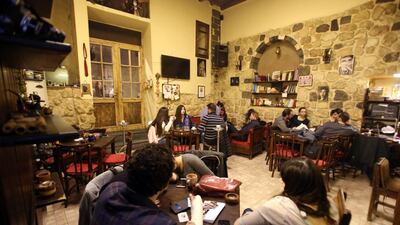Helplessness about the predicament in Syria has led some peddlers of international initiatives at the United Nations to overindulge in hopeful rhetoric and optimistic projections. That was the view of Mashari Al Thaydi, the Saudi senior columnist at the pan-Arab daily Asharq Al Awsat in an article entitled What if the Syrian Truce Were to End?
He wrote that the UN secretary general, Ban Ki-moon, had looked confident and spoke with a smile when he said the truce in Syria, which began only a few days ago, is solid.
For his part, Staffan de Mistura, the UN envoy to Syria, seemed more conservative with his views. He said it is up to Russia and the US to guarantee the truce is a success.
On the ground, however, Al Thaydi said opposition forces are claiming that raids by Assad regime forces and their Russian and Hizbollah allies continue.
The White House has responded to alleged breaches by Assad forces by saying the truce should be given time to take effect. Secretary of state John Kerry said he agreed with the policy of his Russian counterpart not to discuss the breaches publicly.
“In reality, there is an overriding fear, especially in the Obama administration, of the repercussions if the truce were announced as over,” he wrote.
“The solution then is to revive the truce by any means possible under the pretext of humanitarian motives.
“But the real reason behind Washington’s new obsession with the Syrian truce, seen from an Arab’s perspective, is the lack of political foresight and grit. From a different perspective, it looks like a long-term American scheme to segment Syria along ethnic and sectarian lines.”
Interpretations differ about the United States’ plan B in Syria, should the truce fail to hold. Some observers project that Washington would agree with the Russians on the segmentation or federalisation of Syria. Others surmise that the US would adopt the Saudi-Turkish concept for a solution, namely creating safe zones and an intervention on the ground.
“It is important to distinguish between reality and illusions,” he added.
“Who is to say that Bashar Al Assad and his allies could move from the battleground to peaceful political grounds? Or that Iran would agree to a new version of Syria other than the one it is striving to create? And who is to guarantee that Russia would withdraw easily from Syrian territories as soon as a new Syria is born?
“Certainly, a political solution would be preferable, but it is a mistake in this case to confuse reality with illusion. There are things that can be negotiated and then, there are things that require a fight,” he concluded.
For his part, the Tunisian columnist Ameen bin Masoud wrote in the London-based daily Al Arab that the efforts that were exerted at the UN Security Council to agree on a truce in Syria are indicative of how profoundly complex the Syrian predicament is.
Five years of conflict and battles have churned nothing more than a fragile truce that could be breached at any moment in the absence of control and punitive measures.
“It is unrealistic to depend on the major players on the Syrian landscape – Washington and Moscow – to guarantee the truce and take it from the battleground into the realm of politics to reach a comprehensive solution in Syria,” he wrote.
“The current US administration is preparing to leave the White House. This means that the political priority would be given to internal US issues at the expense of regional and international issues.
“Meanwhile, powerful regional players are seeking to secure political and military gains in Syria before the next US administration arrives in the White House.”
Turkey doesn’t want to see the Syrian conflict leading to the birth of a Kurdish entity that would bring more support to the Kurdish cause. Saudi Arabia wants to support its presence in Syria, while Tehran is prepared to do anything to maintain its political, military and economic clout there, he added.
“It seems that regional players have yet to realise their objectives in full – or at least, to abort their opponents’ plan. This indicates that they are preparing for round two of the military-political conflict that would lead to tangible outcomes in favour of one camp over the other.
“The announcement of the truce in Syria may be the calm that precedes the storm. Everyone talks peace while preparing for yet another round of battles,” he concluded.
Translated by Racha Makarem
rmakarem@thenational.ae

